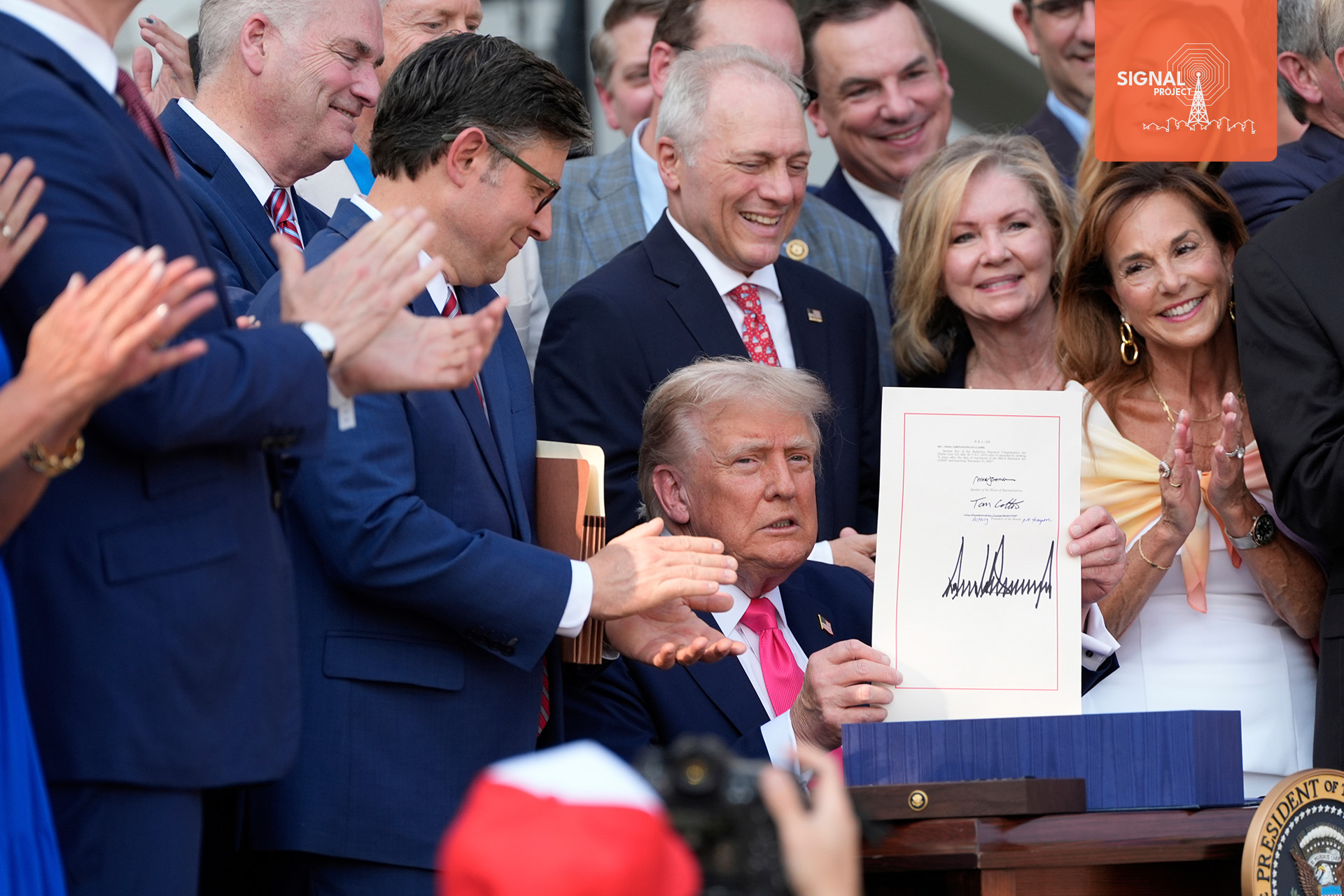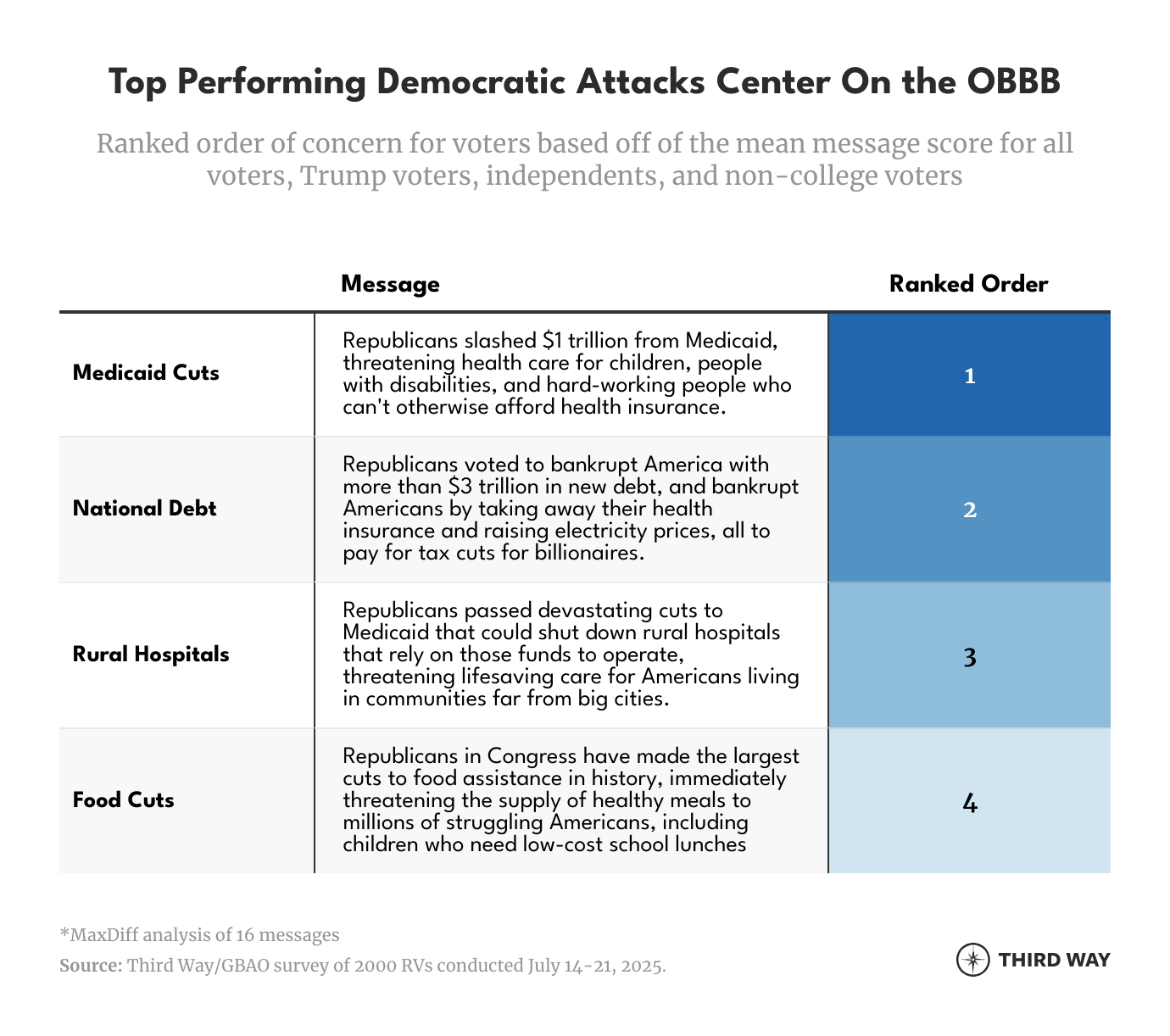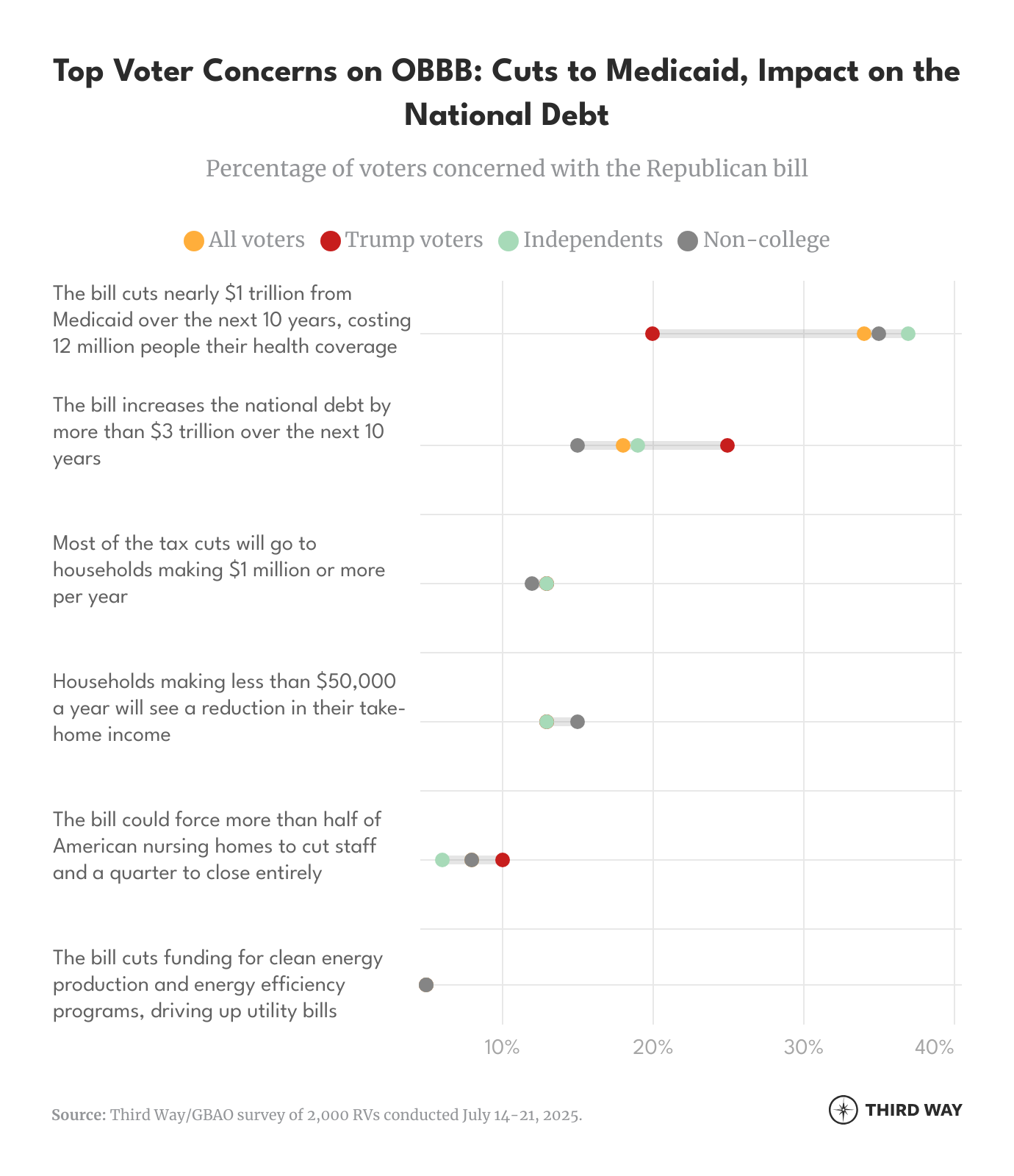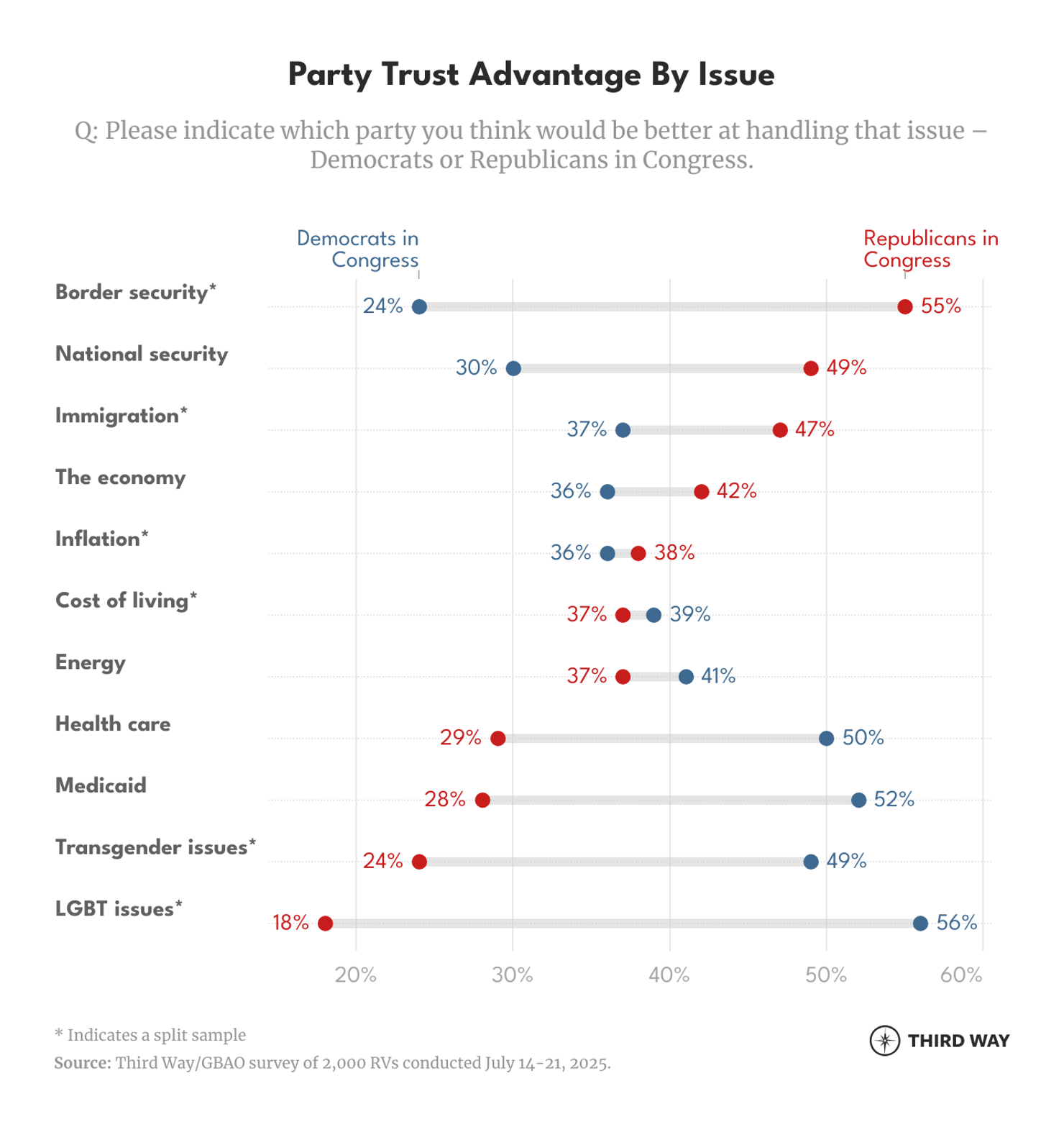Memo Published August 1, 2025 · 9 minute read
Big Beautiful Bellyaches: Americans’ Pain and Frustration Worsens After Six Months of Misplaced Priorities
David de la Fuente

This month, Third Way worked with GBAO to conduct an online survey of 2,000 registered voters—the second poll in our effort to separate the signal from the noise in the chaotic news environment of Trump 2.0. This research set out to understand which of Trump’s actions have been most salient with voters and which specific arguments were most effective in moving persuadable Trump supporters and Independents.
Americans are getting less optimistic about the state of the country, and nothing that congressional Republicans or President Trump have done this summer has appeared to help calm people’s nerves and frustration. Right now, opposition to the One Big Beautiful Bill Act (OBBB) is driving intense opposition and dwarfing other issues. We tested 16 statements on the OBBB, and three tested the best by a large margin.
- Republicans slashed $1 trillion from Medicaid, threatening health care for children, people with disabilities, and hard-working people who can't otherwise afford health insurance.
- Republicans voted to bankrupt America with more than $3 trillion in new national debt and bankrupt Americans by taking away their health insurance and raising electricity prices, all to pay for tax cuts for billionaires.
- Republicans passed devastating cuts to Medicaid that could shut down the rural hospitals that rely on those funds to operate, threatening lifesaving care for Americans living in communities far from big cities.
It should be noted that this poll was drafted and programmed before the issue of the Jeffrey Epstein files broke into congressional debates and reentered the American consciousness. As others do research that includes that topic, this guidance should be seen as complementary rather than in opposition if others find that is breaking through.
Americans are Losing Hope
The first poll in this series was conducted in March of 2025. Back then, voters said by a 15-point margin that the country was on the wrong track. That sentiment has only worsened over the summer. It’s now -18, with 59% saying that the country is on the wrong track, compared to 41% who say we’re on the right track. Even 24% of voters who pulled the lever for Trump now say things are on the wrong track, consistent with the 22% that said so in the spring, which shows that the fury of executive orders and legislative action has done little to calm the nerves of those feeling unhappy.
This unease translates to how Americans feel about their leaders as well. The President’s approval rating has plummeted from -2 points in March to -10 points in July. Just 45% of Americans think he is doing a good job. While there is no statistically significant difference between that number and his favorability rating, this poll does maintain the pattern that Trump’s personal favorable ratings are slightly worse than his job approval rating, clocking in at -12 points.
As bad as Trump’s numbers are, the Democratic and Republican parties are in worse shape. Republicans overall and Republicans in Congress are both at -14 points, which is a slide from -6 in the spring (when the poll asked only about the party). Democrats have backslid a bit, from -14 in the spring to -17 now. Though, it should be noted that Democrats are less unpopular with those who didn’t vote in 2024 but could vote in future elections (-17 points compared to -36 for Republicans). The main difference is that Harris voters have fewer good feelings about the Democratic Party (+42 points) compared to Trump voters who like the Republican Party by a 59-point margin.
When asked if things are going better or worse in Trump’s second term as expected, 41% say worse, and 26% say better. This is a wider spread than the 40/30 we found in the spring. Notably, the movement isn’t from Independents but from Trump voters who have gone from 57% better/9% worse in the spring to 50% better/14% worse today, a 12-point decrease. Among Independents, those finding things worse than expected hasn’t moved (42% then, 43% today), but those saying things are better than their expectations have decreased from 24% to 19%.
Congressional Republicans are struggling in the public eye. When asked about attributes, 60% said the phrase “cares about people” does not describe them well, while 61% said “have the wrong priorities” does describe them well, and 56% agreed that “corrupt” describes them well. Even 27% of people who voted for Trump in 2024 thought congressional Republicans were corrupt.
Republicans’ Big Beautiful Blunder
The One Big Beautiful Bill Act has broken through to the majority of American voters. Overall, 72% of voters have heard “a great deal” or “some” about the legislation, with 28% saying they heard a little or nothing about it. Perhaps surprisingly, 69% of Independents say they have heard “a lot” or “some” about the legislation, meaning that it is breaking through to nonpartisans in a convincing manner relative to their partisan counterparts. By a 10-point margin, people aren’t fans, with only 42% saying they approve.
Independents don’t like the bill at all, with only 32% approving while 57% disapprove. Harris voters hate it (90% disapprove), while Trump voters break 81% in favor to 15% opposed. Among those who currently approve of Trump’s job performance, support of the bill is 87% in favor to 8% in opposition. While Trump voters who don’t currently approve of Trump are a small group, further research on them would be warranted. and this finding could point to the Trump Administration’s current actions being insufficient or counterproductive to bring these folks back into the fold.
The intensity of the opposition is more pronounced than support is, with 37% saying they strongly oppose the bill, compared to only 16% who say they strongly support it. There is no difference in voter reaction between calling it a Republican bill or Trump’s bill, so given that Trump is not on the ballot in 2026, the new law should be framed as the work of congressional Republicans to make them own it directly.
In a MaxDiff exercise, our poll tested many actions that congressional Republicans are taking or failing to take, and components of this bill proved important to respondents.1 For instance, cuts to Medicaid were the number one item raising concerns about congressional Republicans. This was by far the most impactful issue for Independents and non-college voters. It was also narrowly the best-testing message among Trump voters.

Clocking in second was the idea that the bill adds trillions to the national debt, hurting Americans in order to give tax breaks to billionaires. This did relatively well with Trump voters, who ranked it almost as high as the Medicaid cuts. The third and fourth best-testing messages also focused on components of the bill, including the impact on rural hospital cuts and food assistance cuts.
Arguments around congressional Republicans allowing corruption to flourish in the White House, not holding town halls, funding harsh immigration enforcement efforts, and supporting tariffs didn’t test as highly. A similar tariff message was one of the best-performing in our poll earlier this spring, which shows that while Americans may still oppose tariffs, they have fallen in salience over the summer amid concerns around the budget bill.
Overall, when asked which aspect of the bill is the most concerning, a plurality of all voters, Independents, and non-college voters said cuts to Medicaid and kicking millions off their health coverage worried them the most. However, among Trump voters, a plurality said they were most concerned about increasing the national debt.

In the MaxDiff exercise, the one message not explicitly about the budget bill that ranked highly was the idea that Republicans always cave to Trump, changing their positions even if it will have negative consequences for the American people.
Take The Fight to Republicans
Voters’ concerns about the budget bill are helping to give Democrats a credibility advantage on a handful of key issues and spotlight the issues that work best.
When asked which party voters trust more on the issues, Democrats have large advantages on health care (50% to 29%) and Medicaid (52% to 28%). Even among Trump voters, only 56% said they trusted Republicans more than Democrats on Medicaid.

Republicans have also seen erosion in their advantages on economic issues, with our poll finding Democrats now up three points on the cost of living and Republicans only up two points on inflation and six points on the economy overall. Democrats have a four-point advantage on energy issues.
On the culture war issues that Trump likes to highlight, voters are split. Republicans maintain a 1o-point advantage on immigration, which ballons to 31 points when it comes to border security. Democrats have a 38-point advantage on LGBT issues, but that slightly contracts to 25 points on transgender issues.
Our survey also tested potential policy framing for Democrats. We asked voters to rank agreement on a scale of 0 to 10 in terms of support, with all scores at six or above considered supporting. There was little difference in partisan support among them.
- Rewarding working people by letting them keep their money while ending tax breaks for billionaires and corporations (8.3 mean score, 85% support).
- Banning members of Congress from trading individual stocks (8.3 mean score, 83% support).
- Eliminating taxes on Social Security benefits and making the wealthiest pay their fair share into the system (8.3 mean score, 84% support).
- Strengthening disclosure and conflict of interest laws (8.4 mean score, 84% support).
Two of these four policy prescriptions people responded best to were focused on accountability, namely banning individual stock transactions and strengthening disclosure and conflict of interest laws. However, in the MaxDiff exercise, it is purely budget issues that rise to the top. It seems to signal that while voters will always want to see strong accountability measures, right now, they are most intensely focused on the budget cuts, especially Medicaid cuts. It speaks to the potential benefits of keeping some of the evergreen anti-corruption red meat in messages that are linked to the economic hits that land so well here.
Conclusion
The One Big Beautiful Bill Act will be one of the Republicans’ signature actions of this Congress. It is unpopular: voters see it as hurting those struggling to pay their bills to provide tax breaks for the wealthy. As Congress heads home for August recess, congressional Republicans could see real backlash. This presents an opportunity for Democrats but only if they stay on message and don’t miss the signal for the noise.

